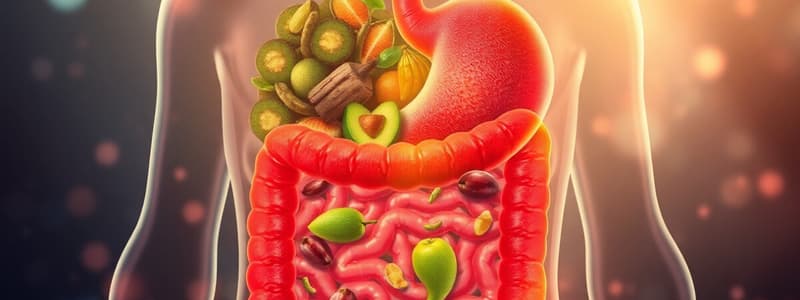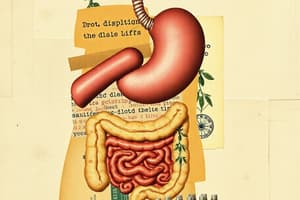Podcast
Questions and Answers
Which gland is primarily responsible for producing nocturnal saliva?
Which gland is primarily responsible for producing nocturnal saliva?
- Pancreas
- Submaxillary glands (correct)
- Sublingual glands
- Parotid glands
What role does bile play in digestion?
What role does bile play in digestion?
- Emulsifies fats into fatty acids (correct)
- Turns proteins into amino acids
- Breaks down carbohydrates
- Absorbs nutrients directly
Which of the following is NOT classified as a common digestive disorder?
Which of the following is NOT classified as a common digestive disorder?
- Gallstones
- Cirrhosis (correct)
- Diarrhea
- Appendicitis
What function does ptyalin serve in the digestive system?
What function does ptyalin serve in the digestive system?
What is the primary function of the gallbladder?
What is the primary function of the gallbladder?
What is the primary function of the small intestine in the digestive system?
What is the primary function of the small intestine in the digestive system?
Which of the following best describes peristalsis?
Which of the following best describes peristalsis?
What role do villi play in the digestive system?
What role do villi play in the digestive system?
What is chyme?
What is chyme?
Which part of the digestive system is primarily responsible for water absorption?
Which part of the digestive system is primarily responsible for water absorption?
What digestive process begins when food is chewed?
What digestive process begins when food is chewed?
What is the role of the anus in the digestive system?
What is the role of the anus in the digestive system?
What is the function of digestive enzymes?
What is the function of digestive enzymes?
Flashcards
What is a bolus?
What is a bolus?
Chewed food in the mouth.
What is an enzyme?
What is an enzyme?
A chemical substance that speeds up chemical digestion.
What is peristalsis?
What is peristalsis?
Muscular contractions that move food down the esophagus.
What main organ is responsible for churning and digesting food?
What main organ is responsible for churning and digesting food?
Signup and view all the flashcards
What is chyme?
What is chyme?
Signup and view all the flashcards
What is the small intestine?
What is the small intestine?
Signup and view all the flashcards
What are villi?
What are villi?
Signup and view all the flashcards
What is the rectum?
What is the rectum?
Signup and view all the flashcards
What is the anus?
What is the anus?
Signup and view all the flashcards
Which salivary glands are the largest?
Which salivary glands are the largest?
Signup and view all the flashcards
What is the smallest salivary gland?
What is the smallest salivary gland?
Signup and view all the flashcards
What is ptyalin?
What is ptyalin?
Signup and view all the flashcards
What is the liver?
What is the liver?
Signup and view all the flashcards
Study Notes
Digestive System Explained
- The digestive system is responsible for breaking down food and liquids into nutrients and fuel.
- The digestive process begins in the mouth with chewing (mechanical digestion) and the action of enzymes (chemical digestion).
- Bolus is the term for chewed food in the mouth.
- Enzyme is a chemical substance that speeds up chemical digestion.
- The esophagus is a tube that carries food from the mouth to the stomach through muscle contractions called peristalsis.
- The stomach, a J-shaped muscular bag, churns, digests, and stores food.
- Chyme is the soupy mixture of broken-down food and gastric juices formed in the stomach.
- The small intestine is the primary site for nutrient digestion and absorption.
- Villi are small finger-like projections in the small intestine that absorb digested nutrients.
- The large intestine absorbs water, minerals, and remaining nutrients.
- The rectum, the final section of the large intestine, stores feces before elimination.
- The anus is the body opening where feces are eliminated.
Key Organs in the Digestive System
- Salivary glands produce saliva, which contains digestive substances and moistens the mouth.
- The parotid glands are the largest salivary glands, located in the cheeks.
- The submaxillary glands are located inside the lower jaw and produce most nocturnal saliva.
- The sublingual glands are the smallest salivary glands, located below the tongue.
- Ptyalin, an enzyme found in saliva, converts starch into sugar.
- The pancreas secretes pancreatic juice into the small intestine.
- The liver, the largest gland in the body, secretes bile, which aids in fat digestion.
- The gallbladder stores bile.
Common Digestive Diseases/Disorders
- Diarrhea is frequent watery stool.
- Intestinal worms/parasites can cause stomach pain and deplete intestinal nutrients.
- Indigestion (dyspepsia) is another term for upset stomach.
- Constipation is difficult bowel movements due to hard stool.
- Appendicitis is an inflammation of the appendix.
- Ulcers are sores on the lining of the stomach, small intestine, or esophagus.
- Gallstones are hardened deposits of bile that can form in the gallbladder.
Studying That Suits You
Use AI to generate personalized quizzes and flashcards to suit your learning preferences.




